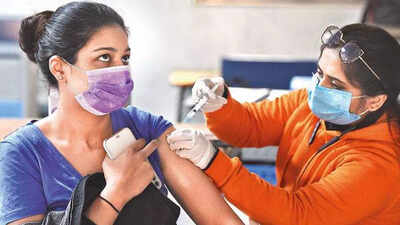Top Searches
- News
- City News
- delhi News
- Delhi reports 1,383 new Covid cases amid call to ramp up testing
Delhi reports 1,383 new Covid cases amid call to ramp up testing

Vaccination remains the key in Covid fight
NEW DELHI: Delhi on Tuesday recorded 1,383 fresh infections with the positivity rate falling to 7.22% owing to increased testing. One fatality was reported compared with six on Monday, when 1,060 new cases were reported with a positivity rate of 10.09% from 10,506 tests.
The number of patients admitted to hospitals went up on Tuesday. Delhi Corona app showed 259 patients with 75 in the ICU and 64 on oxygen support, including 11 on ventilator support.
Gurgaon, meanwhile, reported 389 new cases on Tuesday with a positivity rate of 9.7%. It has recorded 5,499 cases this month, averaging 262 daily. Currently, it has 1,683 active cases, with 22 patients admitted to hospitals. Between June 1 and 12, less than 10 patients were in hospitals. Since June 14, between 13 and 22 patients have been hospitalised.
The Gurgaon administration notified five micro-containment zones on the recommendation of the health department after a task force meeting. The sealed areas include Tower D in Block-A of Silverglades The Ivy (Sushant Lok-I), Tower B4 of Aloha Apartments (Sector 57), Block-D of Grand Arch Spectre (Sector 58), a house in DLF-III and a flat in Sheeba Apartments (Sector 28).
With 99 new cases, Faridabad has recorded 1,301 cases this month, a daily average of 62. The positivity rate was 7.6%. Noida recorded 125 cases on Tuesday, taking the tally of active cases to 606. The positivity rate was 6.25%. As many as 15 patients are in hospitals. With 55 new cases, Ghaziabad’s tally has touched 612 this month. Currently, it has 317 active cases and a positivity rate of 1.1%. In all, seven patients are in hospital.
Covid-19 cases started rising in Delhi from June 7, but the daily testing capacity has remained less. In the last two weeks, there were only two days when sample collection was above 21,000. On the rest of the days, around 19,000 tests were conducted. Despite the surge, Delhi government has not increased the testing capacity.
A spokesperson said Delhi government had the capacity to test about one lakh samples daily. “We have not given any instructions for taking fewer samples. The focus is on RT-PCR and we have got all the necessary facilities to ramp up testing. The samples collected are fewer because there has not been any major surge in cases. No one is refused a Covid test and around 20,000 people are turning up for it daily,” he added.
However, Dr Lalit Kant, former scientist and head, epidemiology and communicable diseases division, ICMR, said, “If we increase the number of samples, daily cases will also go up. More tests should be conducted to understand which variant is leading the surge. Genome sequencing is much needed to evaluate the presence of B.A 4 and B.A 5, which are becoming the dominant factor in the US and European countries.”
The number of patients admitted to hospitals went up on Tuesday. Delhi Corona app showed 259 patients with 75 in the ICU and 64 on oxygen support, including 11 on ventilator support.
Gurgaon, meanwhile, reported 389 new cases on Tuesday with a positivity rate of 9.7%. It has recorded 5,499 cases this month, averaging 262 daily. Currently, it has 1,683 active cases, with 22 patients admitted to hospitals. Between June 1 and 12, less than 10 patients were in hospitals. Since June 14, between 13 and 22 patients have been hospitalised.
The Gurgaon administration notified five micro-containment zones on the recommendation of the health department after a task force meeting. The sealed areas include Tower D in Block-A of Silverglades The Ivy (Sushant Lok-I), Tower B4 of Aloha Apartments (Sector 57), Block-D of Grand Arch Spectre (Sector 58), a house in DLF-III and a flat in Sheeba Apartments (Sector 28).
With 99 new cases, Faridabad has recorded 1,301 cases this month, a daily average of 62. The positivity rate was 7.6%. Noida recorded 125 cases on Tuesday, taking the tally of active cases to 606. The positivity rate was 6.25%. As many as 15 patients are in hospitals. With 55 new cases, Ghaziabad’s tally has touched 612 this month. Currently, it has 317 active cases and a positivity rate of 1.1%. In all, seven patients are in hospital.
Covid-19 cases started rising in Delhi from June 7, but the daily testing capacity has remained less. In the last two weeks, there were only two days when sample collection was above 21,000. On the rest of the days, around 19,000 tests were conducted. Despite the surge, Delhi government has not increased the testing capacity.
A spokesperson said Delhi government had the capacity to test about one lakh samples daily. “We have not given any instructions for taking fewer samples. The focus is on RT-PCR and we have got all the necessary facilities to ramp up testing. The samples collected are fewer because there has not been any major surge in cases. No one is refused a Covid test and around 20,000 people are turning up for it daily,” he added.
However, Dr Lalit Kant, former scientist and head, epidemiology and communicable diseases division, ICMR, said, “If we increase the number of samples, daily cases will also go up. More tests should be conducted to understand which variant is leading the surge. Genome sequencing is much needed to evaluate the presence of B.A 4 and B.A 5, which are becoming the dominant factor in the US and European countries.”
FOLLOW US ON SOCIAL MEDIA
FacebookTwitterInstagramKOO APPYOUTUBE
Looking for Something?

Start a Conversation
end of article









